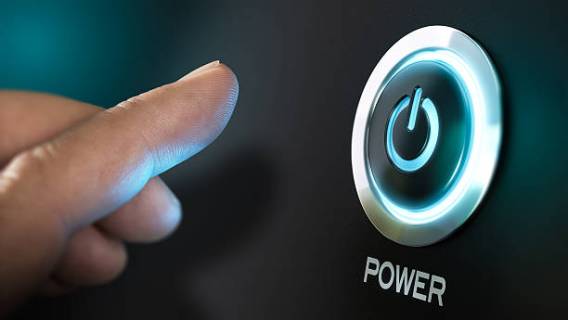More info:
Not trying to argue at all, just pointing out that there are varying thoughts on this topic of leaving systems continuously powered on.
Here is an article that is a bit older, but the title alone is rather striking: "Leaving Computers On Helps Them Last Longer".

 www.scientificamerican.com
www.scientificamerican.com
Some more sources, I wouldn't necessarily consider all of these authoritative, but it simply points out that it's a topic not all agree upon:
"Depending on how often you use your computer, leaving it on could actually help the life of internal components. What many people don’t realize is it takes a lot of power to restart the internal functions of a computer. Leaving your computer on doesn’t cause as much stress as continuously turning it on and off. However, there is still stress being added at a constant rate. This may sound confusing but there are things to consider. Every time a computer is turned on after a full shut down, there’s a power surge that causes hard drives to jolt and forces fans and other components to spin.
With an older computer, leaving it on helps relieve stress as components are aging and may not be stable enough to run with constant electrical currents."

 www.komando.com
www.komando.com
Here is an article that has pros and cons for both arguments:
"Frequently powering down your computer harms its hardware and prematurely shortens its lifespan. However, leaving your computer constantly running is also likely to do the same. There are reasons for and against doing both; in this article we’ve outlined what those are."

 www.alphr.com
www.alphr.com
There are plenty of more articles supporting both sides of the argument. My point is simply that I wouldn't be so adamant on the topic. I think that a balance is called for. If you want to leave your system running, feel free to do so. I wouldn't get myself twisted into a pretzel over it. On the other hand, there are good reasons to support powering off every evening. Power savings is one such great reason.
At least in my bedroom, I power systems off because all the stupid blinking lights drive me nuts when I'm trying to sleep
Not trying to argue at all, just pointing out that there are varying thoughts on this topic of leaving systems continuously powered on.
Here is an article that is a bit older, but the title alone is rather striking: "Leaving Computers On Helps Them Last Longer".

Leaving Computers On Helps Them Last Longer
You are finished using your PC for the day. Should you turn it off or leave it on?
Some more sources, I wouldn't necessarily consider all of these authoritative, but it simply points out that it's a topic not all agree upon:
"Depending on how often you use your computer, leaving it on could actually help the life of internal components. What many people don’t realize is it takes a lot of power to restart the internal functions of a computer. Leaving your computer on doesn’t cause as much stress as continuously turning it on and off. However, there is still stress being added at a constant rate. This may sound confusing but there are things to consider. Every time a computer is turned on after a full shut down, there’s a power surge that causes hard drives to jolt and forces fans and other components to spin.
With an older computer, leaving it on helps relieve stress as components are aging and may not be stable enough to run with constant electrical currents."

The pros and cons of leaving your computer on
Leaving your computer on could actually help the life of its internal components. It takes a lot of power to restart those internal functions. Turning a brand new computer off when not being used isn't a bad idea when it is brand new. The product is still within the warranty period.
Here is an article that has pros and cons for both arguments:
"Frequently powering down your computer harms its hardware and prematurely shortens its lifespan. However, leaving your computer constantly running is also likely to do the same. There are reasons for and against doing both; in this article we’ve outlined what those are."

Should You Turn Off Your Computer Every Night
Frequently powering down your computer harms its hardware and prematurely shortens its lifespan. However, leaving your computer constantly running is also likely to do the same. There are reasons for and against doing both; in this article we’ve outlined
There are plenty of more articles supporting both sides of the argument. My point is simply that I wouldn't be so adamant on the topic. I think that a balance is called for. If you want to leave your system running, feel free to do so. I wouldn't get myself twisted into a pretzel over it. On the other hand, there are good reasons to support powering off every evening. Power savings is one such great reason.
At least in my bedroom, I power systems off because all the stupid blinking lights drive me nuts when I'm trying to sleep
My Computers
System One System Two
-
- OS
- Win11 Pro 24H2
- Computer type
- PC/Desktop
- Manufacturer/Model
- Self-built
- CPU
- Intel i7 11700K
- Motherboard
- ASUS Prime Z590-A MB
- Memory
- 64GB (Waiting for warranty replacement of another 64GB for 128GB total)
- Graphics Card(s)
- No GPU - Built-in Intel Graphics
- Sound Card
- Integrated
- Monitor(s) Displays
- HP Envy 32
- Screen Resolution
- 2560 x 1440
- Hard Drives
- 1 x 1TB NVMe SSD
1 x 2TB NVMe SSD
1 x 4TB NVMe SSD
3 x 512GB 2.5" SSD
1 x 4TB 2.5" SSD
5 x 8TB Seagate Barracuda HDD
- PSU
- Corsair HX850i
- Case
- Corsair iCUE RGB 5000X mid tower case
- Cooling
- Noctua NF-S12A chromax.black.swap case fans (Qty. 7) & Home Computer Specifications, Configuration, and Usage Notes General Specifications ASUS Prime Z590-A motherboard, serial number M1M0KC222467ARP Intel Core i7-11700K CPU (11th Gen Rocket Lake / LGA 1200 Socket) 128GB Crucial Ballistix RGB DDR4 3200 MHz DRAM (4 x 32GB) Corsair iCUE RGB 5000X mid tower case Noctua NH-D15 chromax.black CPU cooler Noctua NF-S12A chromax.black.swap case fans (Qty. 7) & Corsair LL-120 RGB Fans (Qty. 3)
- Keyboard
- Corsair K70 Max RGB Magnetic Keyboard
- Mouse
- Logitech MX Master 3
- Internet Speed
- 1Gb Up / 1 Gb Down
- Browser
- Edge
- Antivirus
- Windows Defender
- Other Info
- The five 8TB drives and three 512GB SSDs are part of a DrivePool using StableBit DrivePool software. The three SSDs are devoted purely to caching for the 8TB drives. All of the important data is stored in triplicate so that I can withstand simultaneous failure of 2 disks.
Networking: 2.5Gbps Ethernet and WiFi 6e
-
- Operating System
- Win11 Pro 23H2
- Computer type
- Laptop
- Manufacturer/Model
- Lenovo ThinkBook 13x Gen 2
- CPU
- Intel i7-1255U
- Memory
- 16 GB
- Graphics card(s)
- Intel Iris Xe Graphics
- Sound Card
- Realtek® ALC3306-CG codec
- Monitor(s) Displays
- 13.3-inch IPS Display
- Screen Resolution
- WQXGA (2560 x 1600)
- Hard Drives
- 2 TB 4 x 4 NVMe SSD
- PSU
- USB-C / Thunderbolt 4 Power / Charging
- Keyboard
- Backlit, spill resistant keyboard
- Mouse
- Buttonless Glass Precision Touchpad
- Internet Speed
- 1Gb Up / 1Gb Down
- Browser
- Edge
- Antivirus
- Windows Defender
- Other Info
- WiFi 6e / Bluetooth 5.1 / Facial Recognition / Fingerprint Sensor / ToF (Time of Flight) Human Presence Sensor





